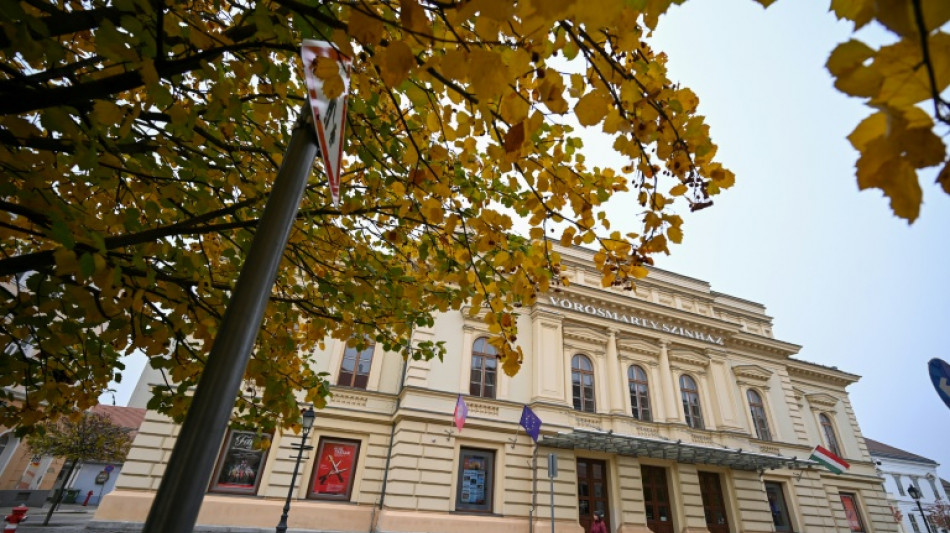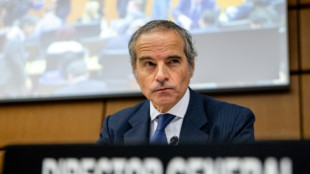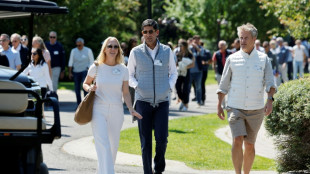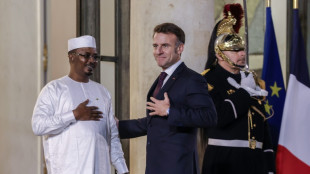
-
 Kremlin says agreed to halt strikes on Kyiv until Sunday
Kremlin says agreed to halt strikes on Kyiv until Sunday
-
Carrick calls for calm after flying start to Man Utd reign

-
 Djokovic to meet Alcaraz in Melbourne final after five-set marathon
Djokovic to meet Alcaraz in Melbourne final after five-set marathon
-
Italian officials to testify in trial over deadly migrant shipwreck

-
 Iran says defence capabilities 'never' up for negotiation
Iran says defence capabilities 'never' up for negotiation
-
UN appeals for more support for flood-hit Mozambicans

-
 Lijnders urges Man City to pile pressure on Arsenal in title race
Lijnders urges Man City to pile pressure on Arsenal in title race
-
Fulham sign Man City winger Oscar Bobb

-
 Strasbourg's Argentine striker Panichelli sets sights on PSG, World Cup
Strasbourg's Argentine striker Panichelli sets sights on PSG, World Cup
-
Jesus 'made love': Colombian president irks Christians with steamy claim

-
 IAEA board meets over Ukraine nuclear safety concerns
IAEA board meets over Ukraine nuclear safety concerns
-
Eurozone growth beats 2025 forecasts despite Trump woes

-
 Dutch PM-elect Jetten says not yet time to talk to Putin
Dutch PM-elect Jetten says not yet time to talk to Putin
-
Social media fuels surge in UK men seeking testosterone jabs

-
 Forest face Fenerbahce, Celtic draw Stuttgart in Europa League play-offs
Forest face Fenerbahce, Celtic draw Stuttgart in Europa League play-offs
-
US speed queen Vonn crashes at Crans-Montana, one week before Olympics

-
 Trump nominates former US Fed official as next central bank chief
Trump nominates former US Fed official as next central bank chief
-
New Dutch government pledges ongoing Ukraine support

-
 Newcastle still coping with fallout from Isak exit, says Howe
Newcastle still coping with fallout from Isak exit, says Howe
-
Chad, France eye economic cooperation as they reset strained ties

-
 Real Madrid to play Benfica, PSG face Monaco in Champions League play-offs
Real Madrid to play Benfica, PSG face Monaco in Champions League play-offs
-
Everton winger Grealish set to miss rest of season in World Cup blow

-
 Trump brands Minneapolis nurse killed by federal agents an 'agitator'
Trump brands Minneapolis nurse killed by federal agents an 'agitator'
-
Arteta focuses on the positives despite Arsenal stumble

-
 Fijian Drua sign France international back Vakatawa
Fijian Drua sign France international back Vakatawa
-
Kevin Warsh, a former Fed 'hawk' now in tune with Trump

-
 Zverev rails at Alcaraz timeout in 'one of the best battles ever'
Zverev rails at Alcaraz timeout in 'one of the best battles ever'
-
Turkey leads Iran diplomatic push as Trump softens strike threat

-
 Zelensky backs energy ceasefire, Russia bombs Ukraine despite Trump intervention
Zelensky backs energy ceasefire, Russia bombs Ukraine despite Trump intervention
-
'Superman' Li Ka-shing, Hong Kong billionaire behind Panama ports deal

-
 Skiing great Lindsey Vonn crashes at Crans-Montana, one week before Olympics
Skiing great Lindsey Vonn crashes at Crans-Montana, one week before Olympics
-
Slot warns Liverpool 'can't afford mistakes' in top-four scrap

-
 Paris show by late Martin Parr views his photos through political lens
Paris show by late Martin Parr views his photos through political lens
-
Artist chains up thrashing robot dog to expose AI fears

-
 Alcaraz outlasts Zverev in epic to reach maiden Australian Open final
Alcaraz outlasts Zverev in epic to reach maiden Australian Open final
-
French PM forces final budget through parliament

-
 French-Nigerian artists team up to craft future hits
French-Nigerian artists team up to craft future hits
-
Dutch watchdog launches Roblox probe over 'risks to children'

-
 Trump brands Minneapolis nurse shot dead by federal agents an 'agitator'
Trump brands Minneapolis nurse shot dead by federal agents an 'agitator'
-
Israel says killed 'three terrorists' in Gaza

-
 After Trump-fueled brawls, Canada-US renew Olympic hockey rivalry
After Trump-fueled brawls, Canada-US renew Olympic hockey rivalry
-
Eileen Gu - Olympic champion who bestrides rivals US, China

-
 Trump, first lady attend premier of multimillion-dollar 'Melania' documentary
Trump, first lady attend premier of multimillion-dollar 'Melania' documentary
-
US Senate eyes funding deal vote as government shutdown looms

-
 Cuddly Olympics mascot facing life or death struggle in the wild
Cuddly Olympics mascot facing life or death struggle in the wild
-
UK schoolgirl game character Amelia co-opted by far-right

-
 Anger as bid to ramp up Malaysia's football fortunes backfires
Anger as bid to ramp up Malaysia's football fortunes backfires
-
Panama court annuls Hong Kong firm's canal port concession

-
 Pioneer African Olympic skier returns to Sarajevo slopes for documentary
Pioneer African Olympic skier returns to Sarajevo slopes for documentary
-
Trump threatens tariffs on nations selling oil to Cuba

| VOD | -0.17% | 14.685 | $ | |
| RYCEF | -2.69% | 16 | $ | |
| RELX | -0.81% | 35.875 | $ | |
| CMSC | -0.21% | 23.645 | $ | |
| BTI | -0.13% | 60.13 | $ | |
| NGG | -0.1% | 84.965 | $ | |
| RIO | -2.64% | 92.68 | $ | |
| AZN | 0.39% | 92.95 | $ | |
| GSK | 1.21% | 51.275 | $ | |
| RBGPF | 1.65% | 83.78 | $ | |
| CMSD | 0.17% | 24.1 | $ | |
| JRI | 0.27% | 12.99 | $ | |
| BP | 0.42% | 38.2 | $ | |
| SCS | 0.12% | 16.14 | $ | |
| BCC | -1.57% | 78.93 | $ | |
| BCE | 0.14% | 25.52 | $ |

Lights go out on Hungary stadiums, theatres as energy crisis bites
Rocketing energy bills are forcing Hungary to shutter libraries, theatres, swimming pools and even its new football stadiums for winter.
The state-of-the-art grounds -- symbols of right-wing nationalist Prime Minister Viktor Orban's 12 years in power -- are among a long list of buildings no longer able to cope with rising energy prices in the central European country.
Despite being one of the country's richest cities and being run by Orban's own party, Szekesfehervar is one of many closing its museums, libraries and theatres.
Its new 14,000-capacity city-run stadium also pulled down its shutters this month to save costs, said mayor Andras Cser-Palkovics.
"Community spaces are what make a city. No one was happy about the measures but they accepted that they are needed," Cser-Palkovics, a member of Orban's ruling Fidesz party, told AFP in Szekesfehervar's City Hall.
- 'Won't wait for miracles' -
Like other cities, Szekesfehervar, 60 kilometres (37 miles) southwest of the capital Budapest, has tried to mitigate the effects of these closures.
The next Hungarian league games are in late January, so no football matches have had to be called off because of the stadium's closure.
Local side Fehervar FC, which usually trains at the stadium during the winter, can use other pitches in the city.
"Fehervar FC's professional work is not particularly affected by the drastic decision to save energy," the club said.
Cser-Palkovics said the plan is for the stadium, only built in 2018, to reopen in mid-January, adding that he has asked the league to reschedule evening games in the New Year to save on pitch heating and floodlight costs.
"We should not wait for miracles, we can help ourselves by our own measures," he said.
Elsewhere in the city, the Vorosmarty Theatre will close after performing its Christmas and New Year programme and will reopen in March when the spring season kicks off, said its head Janos Szikora.
"We won't sit around desperately thinking, 'Oh my God what will happen,'" Szikora told AFP, adding that while the theatre is closed actors will find other spaces to rehearse.
- Blaming Brussels -
The energy crisis -- a ripple effect from the Ukraine war -- has piled pressure on nationalist premier Orban, who has made low household utility bills a core policy over the last decade.
Inflation in Hungary reached 21.6 percent in October, its highest level since 1996, and the third highest in the EU, according to Eurostat.
Government-mandated price caps on basic foodstuffs and fuel aimed at stemming price rises have led to shortages in some shops and petrol stations.
With recession looming -- GDP contracted by 0.4 percent in the third quarter -- EU funds totalling more than 14 billion euros ($14.4 billion) have been withheld over corruption and rule-of-law concerns.
"Rising energy bills and even more so inflation are affecting everyone -- the question is who Hungarians will blame for these economic hardships," said Andrea Virag, strategy director of the Budapest-based Republikon think tank.
A government billboard campaign accuses the EU, saying "Brussels sanctions are ruining us", while a government "national consultation" survey sent to households poses leading questions also critical of the sanctions.
"It is clear that the tactic of the Hungarian government and Orban is to put all the blame on Brussels," Virag told AFP. "There is some research that suggests that a huge amount of people believe Fidesz's narrative."
It remains to be seen how many businesses will be forced to close for good in the months to come.
While industrial Szekesfehervar is relatively wealthy, other municipalities particularly in poorer eastern regions are threatened by bankruptcy unless they get state support, according to mayor Cser-Palkovics.
Geza Deli, a pensioner walking on Szekesfehervar's main street, told AFP he agreed with City Hall's strategy of reducing services deemed non-essential.
"Obviously there are some basic public services which need support -- primarily education and healthcare. It is more important that a doctor can take care of me than I can go to a football match," the 72-year-old said.
O.Lorenz--BTB


